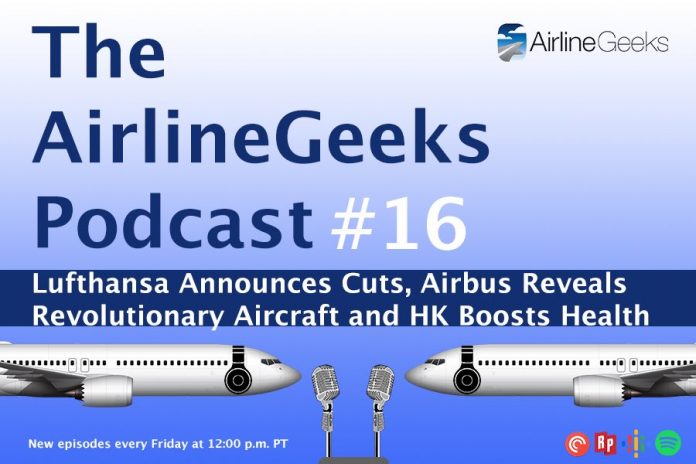By John McDermott
The AirlineGeeks Podcast Episode 16: Lufthansa Announces Cuts as Airbus Reveals Revolutionary Aircraft and Hong Kong Boosts Health
Thank you for reading the AirlineGeeks Podcast Recap. This article gives a brief look at this week’s episode of our news podcast. For our full analysis of each of these stories, you can listen to The AirlineGeeks Podcast on Spotify, Google Podcasts, Apple Podcasts, or through our distributor, Anchor.
Our first story this week considers new job and fleet cuts at Lufthansa, Germany’s flag carrier. The airline, which was planning to make route expansions throughout the fall and winter seasons, believes its goal of recovering to 50% of 2019’s revenue is no longer realistic; the airline, rather, expects it will earn no more than 30% of what it made last year. One hundred fifty aircraft and the crews that staff them will be removed from service through 2025 with long-haul aircraft seeing the largest impact. Over 22,000 full-time positions in total, including but not limited to these cuts, are expected to be impacted by the coronavirus pandemic.
Our second discussion concerns new stories from Airbus. The European manufacturer is celebrating its first 5 years in Mobile, Ala. Airbus opened a plant there to better deliver Airbus A320 aircraft to its North American customers – nearly 200 A320 family planes have been produced there – and it has since expanded the fleet to include A220 family aircraft as well. The plant is directly responsible for 1,000 jobs in Mobile and is believed to support at least 15,000 additional jobs in the U.S. through contracts with aviation contractors, construction agencies who built and continue to maintain the plant’s physical structures, and more.
Airbus also revealed last week its plans for three hydrogen-powered, zero-emission aircraft. Airbus hopes the planes can be in service as early as 2035. The lineup of planes includes a turbofan aircraft with capacity for up to 200 passengers, similar in size to the A320 family; a swept-wing aircraft similar to another swept-wing plane currently supported by KLM Royal Dutch Airlines; and a turboprop aircraft that could carry up to 100 people. Airbus has long wanted to get into the clean aircraft business and has also floated the idea of building battery-powered planes. The French and German governments, both major shareholders in Airbus, have lately pressured the manufacturer to develop greener, more efficient aircraft to combat climate change.
Last, we consider two health developments at Hong Kong International Airport. The airport last week was among the first to receive Airport Health Accreditation for high standards in combating the spread of the coronavirus. The airport has utilized autonomous cleaning robots to keep commonly-touched surfaces clean; facial recognition services throughout the airport to reduce contact between people, and enhanced cleaning practices that the airport hopes will reassure passengers who are nervous about flying during the pandemic.
The airport also banned two airlines – Cathay Dragon and Air India – from operating at the airport for two weeks after it was found the airlines carried high numbers of travelers infected with the coronavirus. All of the passengers found to be sick had originated in India: some had flown directly into Hong Kong via Air India and others had connected from India onto Cathay Dragon flights in Kuala Lumpur. Any airline that carries five COVID-19 passengers or more, or two consecutive flights with three or more diagnosed passengers, risks being banned from Hong Kong under Chapter 599H of the Laws of Hong Kong.
[ad_2]
Source link

